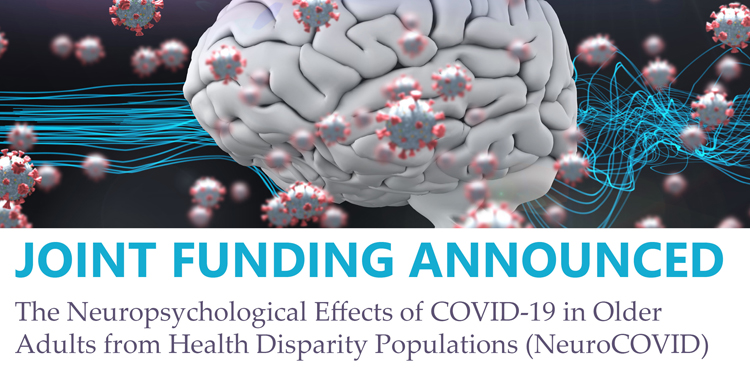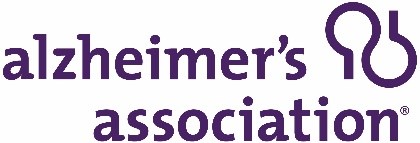


FOR IMMEDIATE RELEASE
ALZHEIMER’S ASSOCIATION, NATIONAL ACADEMY OF NEUROPSYCHOLOGY FUND RESEARCH EXPLORING COVID-19’S IMPACT ON THE BRAIN IN DIVERSE POPULATIONS
Denver, CO, March 8, 2022 — The Alzheimer’s Association and the National Academy of Neuropsychology (NAN) have awarded $800,000 in grants to researchers focusing on the impact of COVID-19 — including cognition, behavior and overall functioning — in older adults from health disparity populations. The funding program, known as NeuroCOVID, supports research to advance our understanding of how the pandemic has affected the brains of older adults disproportionately impacted by COVID-19, yet underrepresented in research.
Older adults are more susceptible to COVID-19 infection than younger people, as well as at higher risk for severe symptoms and worse outcomes, including death. Similarly, COVID-19 has had a profound impact on individuals from diverse populations, leading to poorer outcomes than for White individuals including disproportionate infection, hospitalization, intensive care unit admission and death rates.
Research is starting to illuminate connections between COVID-19 and our brains, including changes in cognition, function and behavior. Some people who have/had COVID-19 experience neurological symptoms, including loss of smell and taste, cognitive deficits and “brain fog.” For some, these neurological symptoms persist, and researchers are working to understand why this brain dysfunction occurs, who is most at risk, and what that may mean for long-term cognitive health. To date, little is known about the neurological impacts of COVID-19 in diverse populations.
The NeuroCOVID program has funded eight projects dedicated to addressing this gap in knowledge. The awarded researchers include:
- Tiffany Walker, MD, Emory University (Neurocognitive Sequelae of COVID-19 in African American Adults)
- Vanessa Zizak, Ph.D., ABPP-CN, Southern California Institute for Research and Education (NeuroCOVID: Determinants of Brain Health in Diverse Older Adults)
- Clara Li, Ph.D., Icahn School of Medicine at Mount Sinai (Biomarkers of COVID-19 Induced Cognitive Loss in Diverse Older Populations)
- Pariya Wheeler, Ph.D., University of Alabama at Birmingham (Neurocognitive Trajectories in Older Adults with COVID-19 in the Deep South)
- Joanna Hellmuth, MD, University of California, San Francisco (COVID-associated cognitive changes, mood, and CSF profiles in older adults)
- Eduardo Zimmer, Ph.D., Federal University Of Rio Grande do Sul (Long COVID effects on brain cognition and biomarkers)
- Carolina Marinho, Ph.D., Fundação de Desenvolvimento da Pesquisa, Belo Horizonte (Cognitive and neuroimaging assessments in post-Covid-19 syndrome in Brazil)
- Paola Garcia, Ph.D., Mexican Institute of Social Security (COVID-19 infection effects in older adults associated to health disparities)
“From the early days of the pandemic, there were hints of a link between COVID-19 and the brain,” said Heather Snyder, Ph.D., Alzheimer’s Association vice president of medical and scientific relations. “Through our leadership and collaboration with research institutions globally, the Alzheimer’s Association is committed to supporting research that will advance our understanding about this virus and its impact in all communities.”
In addition to the NeuroCOVID program, the Alzheimer’s Association is part of an international, multidisciplinary consortium that is evaluating the long-term impact of COVID-19 on the brain. The consortium is a network of scientific leaders from the Alzheimer’s Association, University of Texas San Antonio Health Sciences Center and teams from nearly 40 countries — with technical guidance from the World Health Organization.
“We recognize that COVID-19 is associated with cognitive complications,” said William Perry, Ph.D., NAN Executive Director. “It’s apparent that older people from underserved communities are more frequently infected and are disproportionately experiencing the consequences of health care disparities.”
“NAN is fortunate to find a partner in the Alzheimer’s Association, who is equally dedicated to addressing the health disparities highlighted by COVID-19,” said Beth Arredondo, Ph.D., NAN President. “These grants have the potential to provide insight into the long-term clinical consequences for older individuals who contract the virus.”
###
About the Alzheimer’s Association
The Alzheimer’s Association is a worldwide voluntary health organization dedicated to Alzheimer’s care, support and research. Our mission is to lead the way to end Alzheimer's and all other dementia — by accelerating global research, driving risk reduction and early detection, and maximizing quality care and support. Visit
alz.org or call 800.272.3900.
About the National Academy of Neuropsychology
The National Academy of Neuropsychology is a membership organization with members from around the world who are doctoral level specialists in the diagnosis and treatment of patients with brain-based disorders, including dementia, stroke, and traumatic brain injury, as well as pediatric disorders, such as ADHD. NAN’s mission includes promoting human welfare and generating and disseminating knowledge of brain-behavior relationships to address the impact of cognitive, behavioral, and emotional disorders on patients’ medical care and patients’ and caregivers’ quality of life.
Contact: William Perry, Ph.D., NAN Executive Director,
[email protected] | MJ Contino, Alzheimer’s Association,
[email protected]